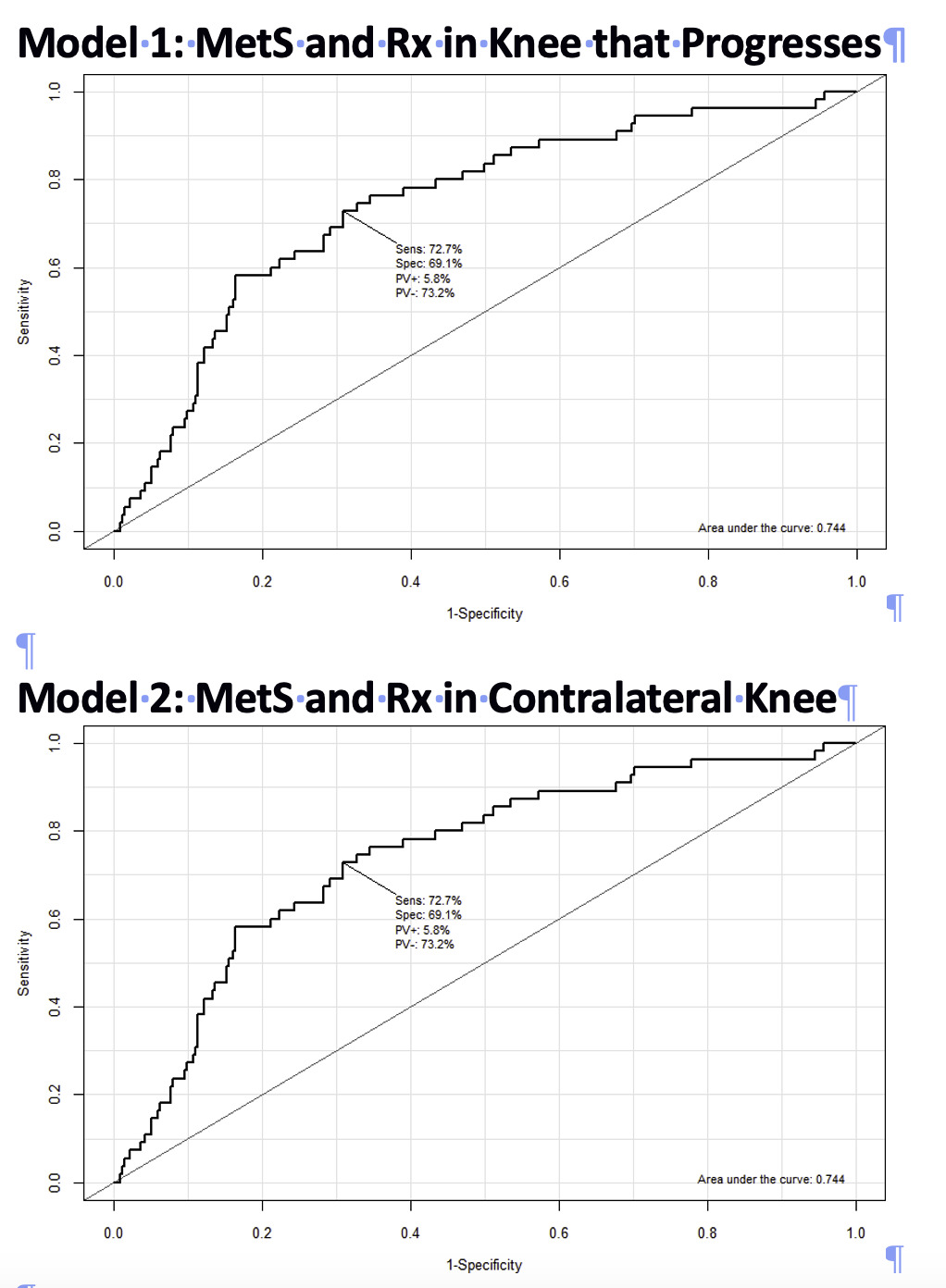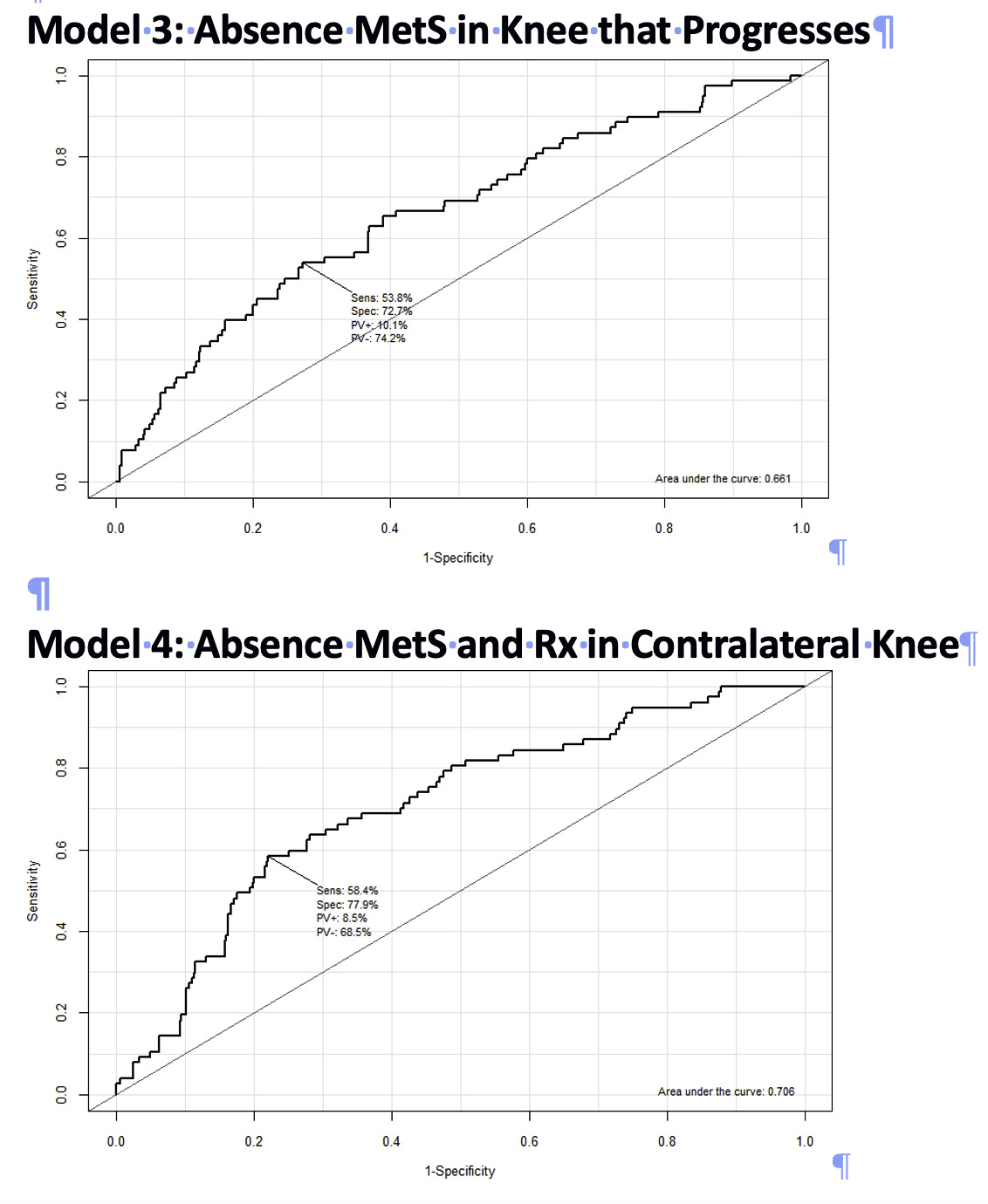Session Information
Session Type: Poster Session B
Session Time: 10:30AM-12:30PM
Background/Purpose: The contribution of metabolic factors to the development of osteoarthritis (OA) has not been fully elucidated. The aim of this study is to analyze the influence of metabolic syndrome (MetS) on the rate of radiographic progression of knee osteoarthritis.
Methods: This cross-sectional study was conducted within the Prospective Cohort of Osteoarthritis A Coruña (PROCOAC), the first osteoarthritis cohort in Spain. We analyzed the association between knee osteoarthritis (OA) and metabolic syndrome (MetS) through a prospective descriptive study in the PROCOAC from 2006 to 2021. This cohort comprises 1,478 individuals with osteoarthritis, of which 678 diagnosed with knee OA were selected. Inclusion criteria included age (over 55 years), radiographic diagnosis of knee OA according to ACR criteria, and follow-up every 2 years, gathering clinical, analytical, genetic, and radiographic data. The radiological grade was assessed using the Kellgren-Lawrence (KL) scale to grade knee OA, and the presence of joint prostheses or fractures was also noted. For assessing metabolic syndrome, we used the ALAD criteria, which include abdominal circumference (in cm) and at least two of the following parameters: triglycerides (< 200 mg/dL), low HDL (< 35 mg/dL), hypertension, and glucose blood levels ( >110 mg/dL). The study involved a univariate analysis comparing different variables between both groups, followed by stepwise logistic regression analysis. Once variables independently related to the probability of progression of knee OA were identified, different models were defined, including clinical and radiological variables with p< 0.20 in the univariate models and other clinically relevant variables.
Results: More than 100 models were built, from which we selected 4 with the best sensitivity, specificity, and AUC data to predict radiological progression in knee osteoarthritis. Model 1 includes 7 clinical variables (age, sex, diabetes mellitus, hypertension, MetS, BMI, and VAS), 1 analytical variable (total cholesterol), and 1 radiological variable (baseline KL grade in the knee that progresses) (AUC=0.74) (Figure 1). Model 2 (AUC=0.74) is similar to Model 1 but also includes the KL radiological grade in the contralateral knee. In both models, MetS is not associated with progression. To confirm the lack of association between MetS and knee OA progression, we designed two additional models, Model 3 (AUC=0.66) and Model 4 (AUC=0.74), which are identical to Models 1 and 2, respectively, but exclude MetS (Figure 2).
Conclusion: In the PROCOAC cohort, regression models confirm that metabolic syndrome is not associated with knee OA progression.
To cite this abstract in AMA style:
Oreiro N, Raga A, Balboa-Barreiro V, Rego-Perez I, Acasuso B, Galindo Domínguez L, Blanco f. Impact of Metabolic Syndrome on Knee Osteoarthritis Severity and Progression: A PROCOAC Cohort Study [abstract]. Arthritis Rheumatol. 2024; 76 (suppl 9). https://acrabstracts.org/abstract/impact-of-metabolic-syndrome-on-knee-osteoarthritis-severity-and-progression-a-procoac-cohort-study/. Accessed .« Back to ACR Convergence 2024
ACR Meeting Abstracts - https://acrabstracts.org/abstract/impact-of-metabolic-syndrome-on-knee-osteoarthritis-severity-and-progression-a-procoac-cohort-study/


